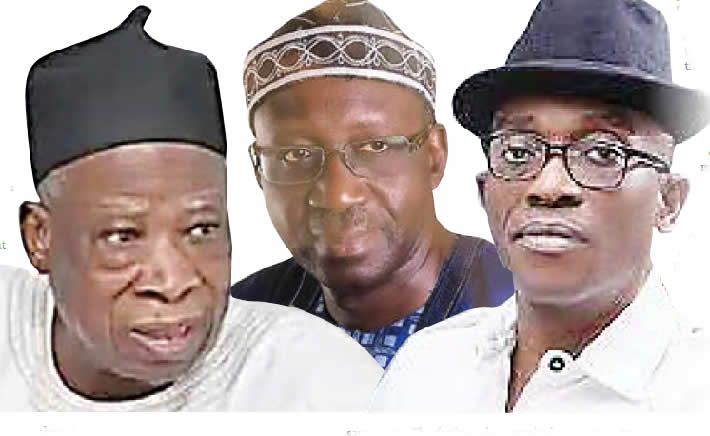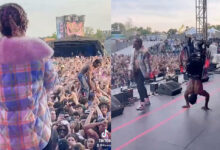Parties battle internal conflicts, chase peace ahead campaign kick-off

[ad_1]

As the 2023 elections beckon, the cracks in some political parties have continued to widen and it appears that there’s no end in sight, OLUWAFEMI MORGAN writes
Apart from the off-cycle governorship elections in Osun, Ekiti and Edo states where intra-party squabbles led to unexpected outcomes, pundits are in no doubt that the tension in the political parties will affect the fortunes of candidates for elective positions in the 2023 general elections. While crises in some of the political parties have always existed, observers say the new dimensions of disagreement, infighting, media war and legal battles have a way of distracting the parties from the germane issues of good governance.
In any democratic space, political parties are meant to be a gathering of conscientious citizens, some of who have the intention of contesting and winning elections. In other words, members of a political party are meant to be individuals bound by common interests to win, retain and manage political power on behalf of the citizens. Opposition parties to the ruling political party are meant to assert themselves as viable alternatives to the people. This is done by providing leadership and keeping the ruling party on its toes through unparalleled commentary on socio-economic issues.
While some have argued that at the core of political infighting is the shortage of ideological base in the parties, others believe that such tussles emerge because of the need to control the power of the party structure at the federal, state, local government and ward levels.
The political parties
This year, there has been a rash of internal wrangling in the various parties. Most of the 18 political parties have at least one problem or the other to grapple with before the 2023 elections. Despite the experience on their side, the main political parties remain enmeshed in squabbles. For instance, it is not yet Uhuru for the presidential candidate of the APC, Bola Tinubu, who is faced with the challenge of encouraging members of the party who are uncomfortable with the controversy trailing the Muslim-Muslim ticket. An APC chieftain in Rivers State, Tonye Princewill, left the party as a result of the controversy. Another chieftain of the party, Yakubu Dogara, vehemently kicked against the Muslim-Muslim ticket, which the ruling political party currently parades.
There is also an eerie silence from political blocs allegedly aggrieved by the fact that they may not have an input in Tinubu’s forthcoming presidential campaign, which is to begin on September 28. Apart from the uncertainty at the national level, it was earlier reported that there were pockets of crises in at least 20 state chapters of the APC across the country. They include Lagos, Kano, Gombe, Kaduna, Bauchi, Zamfara, Kwara, Kebbi, Ondo, Ekiti and Ogun states. Others are Ondo, Osun, Rivers, Cross River, Imo, Benue, Nasarawa, Abia and Akwa Ibom states.
The Peoples Democratic Party is also faced by one crisis or the other. It is believed that the main rancour in the party that may weaken its influence at the polls is the disagreement between Governor of Rivers State, Nyesom Wike, and some bigwigs in the party. So far, several moves to placate Wike and gain his support after he lost the presidential ticket at the PDP convention have met a brick wall.
Also, the presidential candidate of the main opposition party, Atiku Abubakar, has yet to set up his campaign council, which has further heightened the uncertainty in the party. However, Atiku seems willing to lobby for ethnic balance as can be deduced from the recent appointment of Adolphus Wabara as the Chairman, Board of Trustees of the PDP in order to win the hearts of members, who have since pitted their tent with Wike over the issue of ethnic balance. It was earlier reported that 11 state chapters of the PDP were in crisis over the nomination of the governorship candidates in Edo, Ebonyi, Kano, Delta, Abia, Anambra, Enugu, Ekiti, Imo, Akwa Ibom and Lagos.
The other parties
Most of the political parties, which have not gained much national prominence as the PDP are also embroiled in political wrangling a few months to the general elections. For example, in the Accord Party, there is a crisis over the chairmanship position. Justice Olukayode Adeniyi of the Abuja High Court recognised Rev Isaac Adeniyi as the National Chairman of the Accord Party in May 2022. The judgment stood against the Independent National Electoral Commission, the party, the then Chairman of the party, Mohammed Nalado, and the Legal Adviser, Maxwell Ndugbem. Nalado who held sway for the party’s primaries was alleged to have abdicated his position to Adeniyi abruptly.
In the Action Alliance, the National Chairman of the party, Adekunle Rufai, was suspended by the leadership on January 6, 2022, over alleged misappropriation of funds. While many party delegates accused him of corruption, high-handedness, rascality and a plot to change the name of the party, members from the North and the South-West resisted the move, claiming that it was too harsh, hasty, and politically-motivated.
In the Ekiti State chapter of the Action Democratic Party, its Chairman, Olakunle Abegunde, reacted to the suspension letter from the National Secretary, Victor Fingesi, by resigning from the party in May 2022. Abegunde was accused of insubordination by the national leadership because he reportedly refused to visit the secretariat to explain issues at the state chapter.
In the African Action Congress, the crisis has been soaring since the 2019 elections. The Leonard Nzenwa faction of the party had earlier told our correspondent that its erstwhile presidential candidate, Omoyele Sowore, was not the same for the 2023 election. However, the Omoyele Sowore-led faction debunked the claim, saying it was recognised by INEC. A recent court ruling also asserted that Sowore remained the presidential candidate of the party, thereby leading to the withdrawal of the factional presidential candidate of the Ezenwa faction, Yakubu Mohammed, from the race.
On the front burner of recent public discourse is the tussle over the control of the African Democratic Congress. The brewing crisis came to a head when the Emeka Nwosu-led National Working Committee of the party suspended the presidential candidate, Dumebi Kachikwu, on Friday, September 2, 2022 for alleged anti-party activities and defamatory statements.
Kachikwu told AriseTV that he did not support the extension of the term for Nwosu as chairman of the party, explaining that Nwosu had spent 17 years in office and this was not in tandem with the party’s constitution. In what seemed like a rebuttal, the Nwosu-led committee was reportedly removed and replaced by the council of state chairmen, which is performing the function of the NWC.
The council, led by its chairman, Kingsley Ogga, named Patricia Akwashiki as the chairperson of the eight-man caretaker committee; Kenneth Odion, secretary; and Anglia Johnson, a member, to steer the affairs of the party. Ogga said it was impossible for Nwosu, whose tenure had long expired, to have the power to suspend the party’s presidential candidate. In a counter move on Wednesday, September 7, the Nwosu committee pronounced the actions of the state chairmen as illegal. The committee named the 2015 presidential candidate of the party, Mohammed Mani, as the Chairman of the Board of Trustees.
As for the All Progressive Grand Alliance, the battle for the chairmanship of the party between the former chairman, Victor Oye, and a chieftain, Edozie Njoku, has seen both personalities and others within the same fold seeking redress in the courts. The factional leaders operate with different NWCs and parallel structures for the same party. The factions also organised separate party conventions, which produced Prof Peter Umeadi as its presidential candidate for the Oye group, and APGA’s founding national chairman, Chekwas Okorie, for the Njoku group.
For the Allied Peoples Movement, the tension over the suspension of the BoT by the National Executive Committee in February 2022 remains. The issue was over the sum of N27m between its National Chairman, Yusuf Danielle, and the suspended BoT Chairman, Mohammed Bagana. While Bagana claimed that Dantalle diverted N17m of party funds, Dantalle accused him of inability to account for N10m, a sum which Bagana allegedly held on to when the party did not have a bank account.
Meanwhile, all seems unwell in the Lagos chapter of the Labour Party. Saturday PUNCH had reported that the factional chairman of the party, Ifagbemi Awamaridi, claimed that he remained the chairman and governorship candidate despite the claims by the Olukayode Salako faction that Awamaridi served as a governorship placeholder candidate and caretaker chairman until the expiration of both positions through due process. However, Awamaridi said the moves made by the Salako-led faction might lead to the disqualification of the party’s presidential candidate, Peter Obi.
In a rebuttal, the National Publicity Secretary of the party, Abayomi Arabambi, debunked Awamaridi’s claims, saying he voluntarily resigned as a placeholder and that the national leadership of the party did not deem it fit to stretch his caretaker role, thereby appointing Salako as chairman. He stressed that INEC would change Awamaridi’s name on its list in October.
Meanwhile, the fledgling National Rescue Mission is also embroiled in a crisis of ethnic dimension as northern politicians left the party over alleged marginalisation from their southern counterparts in June. The PUNCH had reported that the northern politicians alleged that they were not being carried along in the decision making process of the party. It was also revealed that the party’s convention and primary, which were held in March and June, respectively, produced both the National Chairman, Isaac Udeh, and its presidential candidate, Okwudili Nwa-Anyajike, from the South-East zone.
In the Peoples Redemption Party, the rift over the chairmanship between Falalu Bello and Abdulmajid Daudu has divided the party into factions. Justice Olajuwon of the Federal High Court, Abuja, in suit number FHC/CS/ABJ/575/2021, gave victory to Falalu against the Daudu faction of the party on Thursday, September 1, 2022, noting that the case lacked merit and did not have the powers to pass a vote of no confidence in Falalu.
However, the Daudu faction seems to be working on appealing the judgment. In a telephone interview with our correspondent, the Public Relations Officer of the Daudu faction of the PRP, Idakwo Lawal, confirmed the judgment. He also noted that the leadership of the faction was studying the judgment to determine the next line of action.
In the Social Democratic Party, the tussle for the control of the structure in Ondo State led to the organisation of parallel conventions. While a congress was held in April by the Stephen Adewale faction of the party, the supposedly ousted former chairman, Dele Ogunbameru, conducted a parallel congress in May. The Adewale faction said Ogunbameru had ceased to be chairman of the party. Meanwhile, Ogunbameru claimed that the April 9 congress was a nullity because it was conducted by the Adewale camp without notifying the chairman of the party (himself).
Marriages of convenience
Commenting on the crises rocking the political parties ahead of the campaigns, a human rights activist, Chido Onumah, described many of them as groups involved in marriages of convenience without ideological or philosophical goals toward acquiring power. He stressed that many political parties were formed by strange bedfellows who hoped to use their positions to acquire wealth and negotiate power. Onumah said this might narrow the choice of the electorate in the leaders since many of the parties had lingering issues and were empowered to present to the people a largely unbalanced and rancorous process with limited choices of candidates for the electorate.
The activist, who noted that the parties lacked ideological leanings, added, “I think it is a general malaise in the country; it tells you how weak our democracy is. Political parties in Nigeria are not organic. These parties did not really originate from the people; they are just cobbled together more or less for convenience.”
Speaking on the pockets of wrangling in the parties, he said, “It just tells you that you have a group of people who do not respect the electorate. They do not believe in due process; they do not believe in the democratic process, because the key principle of a political party is to have ground rules for operations. You can’t deviate from those rules; it doesn’t matter who is in power and who is in a particular position, the rules are the rules. All the people need to do is to engage them.
“It has ranging implications; one is that it gives little or no choice to Nigerians. It is what they present to us that we take. It doesn’t matter how the candidates emerge, whether or not they emerge from the true democratic process, we have little say about it. We can see overall what it is in terms of mismanagement, poor governance, accountability issues and so on. So, these politicians get to elective positions and their allegiance is really to the godfather who brings them to power and not the people.”
A lawyer, Dele Farotimi, said the clashes in the parties were an indication that “Nigeria is not in a democracy. If we were in a democracy and power springs from the citizens, then you wouldn’t have these. But because political parties are essentially platforms for capturing power, you are going to have contests for power that are not subject to any law. When the law grants any power, it also regulates the power, but when you have power that does not flow from the law, it flows from impunity; you are going to have people wrangling over who gets what, and who takes what money.”
Farotimi urged the electorate to be conscious of the workings of the ruling class, saying, “The electorate has to educate themselves as to what the rule is and recognise the fact that what they call democracy is actually not democracy, but because our rulers have to pretend that we are in a democracy, it gives us the opportunity to recruit our own leaders. They can take advantage of the lies that the rulers have to sustain.
“As far as the world is concerned, we are a democracy and to pretend that they are practising periodic elections, we have to take advantage of the lies that the rulers have to sustain.”
The Chairman, Public Interest Law Foundation, Ayo Ademiluyi, said political parties in Nigeria were being run like monarchies and that given the reality of the electoral law, the tyranny within the parties was compounded by corruption, violence, threat to life, mistrust and vote-buying.
He stated, “For instance, the new electoral law confers on the national leaders of the parties the sole prerogative of submitting the names of candidates to INEC. This has made the national chairmen very powerful.
“What we have in the political parties in Nigeria are monarchies, and the only advancement that this new electoral law brings is that parties have been modified to become benevolent monarchies. This means that the moment the person wins the primary, he has the legal right to be voted for at the polls. However, if one is now robbed of his legal rights by hook, crook or violence, then it becomes chaotic.”
Ademiluyi also stressed that the crises and the mistrust within the parties often translated into low voter turnout, vote-buying and garrison kind of elections often held in the country.
[ad_2]



